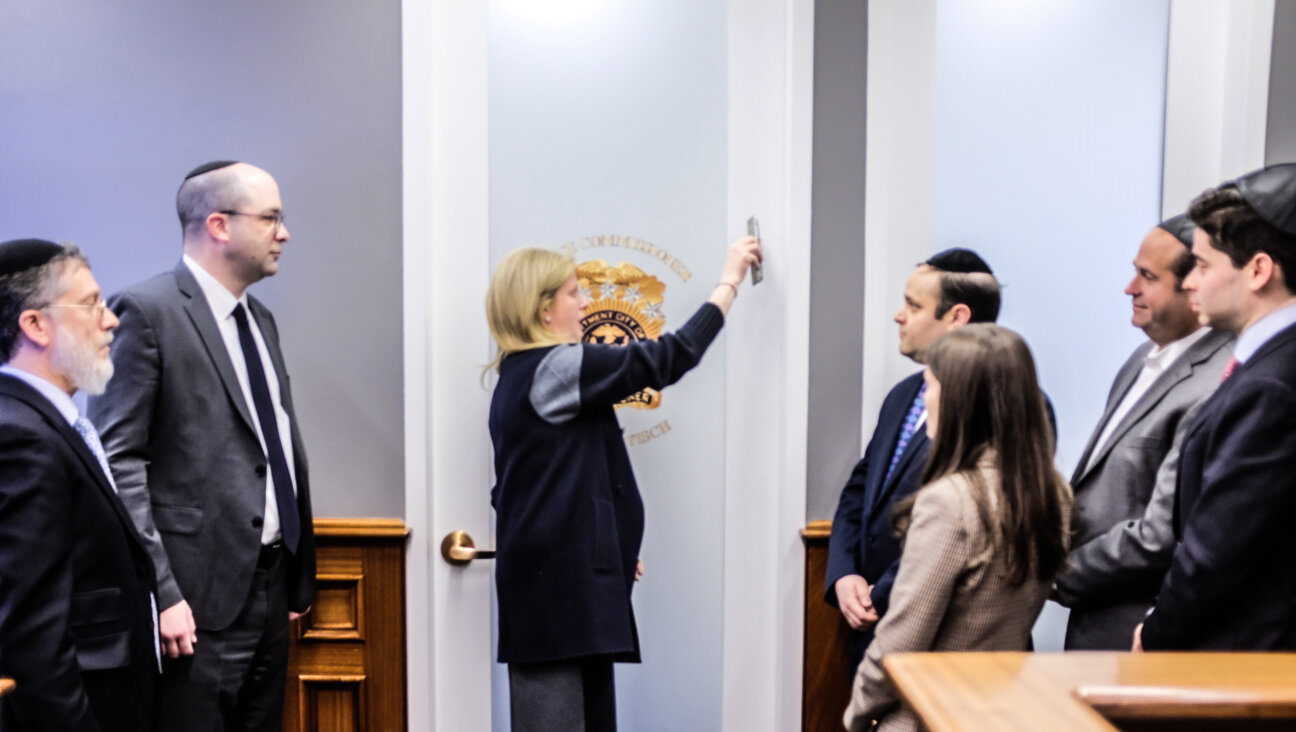CAMPAIGN CONFIDENTIAL
Penn Plotting: Minnesota Republican Senator Norm Coleman stopped in Philadelphia on June 16 to headline a fundraiser for Republican mayoral candidate Sam Katz in what some observers are viewing as part of a Republican strategy to put the Keystone State — which went for Al Gore in 2000 — in the GOP column in 2004.
Noting that President Bush has visited Pennsylvania more times — 20 — during his presidency than any other state besides Texas, Keystone pundit G. Terry Madonna told the Forward that both Democrats and Republicans understand that the stakes of the 2003 mayoral election “transcend Philadelphia and the politics of the city.” From that point of view, Katz can expect a lot of help from the national Republican leadership, Madonna said.
Madonna, a professor at Millersville University, said that his polling shows Bush to be “more popular than any politician in the state,” a fact that gives Pennsylvania’s Democratic governor, Edward Rendell, goose bumps. “The last thing he wants is for this [mayoral race] to go awry,” Madonna said.
Madonna’s last poll, in March, showed Katz holding a 44% to 40% lead over Philadelphia’s incumbent Democratic mayor, John Street, even though 75% of the city’s registered voters are Democrats. But a poll of 700 likely voters done for Street’s campaign by the Washington firm of Lester & Associates from March 3 through April 3 had Street ahead by 48% to 42%.
“The race has already gotten pretty tough. Both sides have been throwing around major barbs,” Madonna said, adding that “there are only 50,000 voters in play in the entire city.” The election is a replay: Street won by fewer than 10,000 votes over Katz four years ago.
Katz, however, disputed Madonna’s assessment that the national Republicans were looking to him, in effect, to help deliver them the state in 2004. “The Democratic Party isn’t going to fold up its tent in Philadelphia,” he said. “They still have a viable organization without regard as to who the mayor is. I expect my success in November would probably be a wake-up call to them.”
Katz added that he would have to govern Philadelphia in a bipartisan manner and so might not be in a position to help the Republican ticket that much. “The Republican Party really can’t elect me. Only the Democratic Party can elect me,” he said, adding, “It remains to be seen what I do after I’m elected.”
Coleman resembles Katz in several respects: Both are centrist and Jewish (as is, for that matter, Rendell). Coleman is a former mayor of St. Paul. Both men have ties to the Republican Jewish Coalition — Katz is on its national board, while Coleman has been crisscrossing the nation speaking at RJC gatherings.
In fact, the Katz fundraiser, which took in $100,000, was “geared to members” of the RJC, Katz told the Forward.
Coleman “spoke about being mayor of St. Paul, about governing from the center, about being a Republican in a Democratic city,” Katz said. He added that Coleman’s talk was so inspirational that “I left feeling invigorated.”
Katz is not the only one who feels that way, evidently. Coleman, a Brooklyn-born former Democrat who attended high school with New York Senator Charles Schumer, campaigned for Hubert Humphrey and went to Woodstock, draws many to RJC events because his life trajectory as a liberal who turned right resonates with many who are making the same “philosophical journey,” according to RJC executive director Matt Brooks. Coleman was slated to appear at two more RJC events, in Orange County and in Los Angeles, last Sunday.
The fact that the Katz campaign did not seek to publicize Coleman’s appearance at the Katz fundraiser raised some Democratic eyebrows.
“That a Republican senator would come into town for a Republican mayoral candidate is not surprising,” said David Hyman, an adviser to Street. “What’s shocking is that it was done behind closed doors. It evidences that Sam does not want to be viewed as being in the same party as Republicans like [Pennsylvania Senator Rick] Santorum and [Mississippi Senator Trent] Lott. It demonstrates his discomfort with the party. You never see the ‘R’ word in his campaign material.”
Katz retorted that he doesn’t publicize any of his fundraisers and said he expects to raise $10 million by the end of the campaign.
* * *|
Boston Bill: Four of the top five Democratic presidential candidates are supporting New Mexico Governor Bill Richardson for the post of chairman of the 2004 Democratic National Convention in Boston.
North Carolina Senator John Edwards, Connecticut Senator Joseph Lieberman, former Vermont governor Howard Dean and Missouri Rep. Richard Gephardt are backing Richardson for the job, one of the most visible and prestigious party positions.
The candidates each sent a letter last week to the chairman of the Democratic National Committee, Terry McAuliffe, expressing support for Richardson.
A former congressman, secretary of energy and ambassador to the United Nations, Richardson is often mentioned as a potential vice presidential pick or as a possible presidential contender in 2008. Of Hispanic background, Richardson is being pushed for the position of convention head by the Hispanic Caucus of the DNC. That group has been concerned about the inroads made by Republicans into the Hispanic vote, previously a solidly Democratic constituency. But the popular, easygoing Richardson is considered by Democrats to be a strong choice for the post no matter his ethnicity.
Richardson “is one of the most dynamic and experienced leaders of our party,” said a spokeswoman for Edwards, Jennifer Palmieri. “He is a great unifying figure. The senator thinks the party would be well served to have him in this position.”
The support of the four candidates is the latest in a series of boosts for Richardson. The chairman of the Hispanic Caucus, Alvaro Cifuentes, said he recently had obtained backing for the New Mexico governor from key African-American Democratic leaders and party operatives, including the outgoing mayor of Denver, Wellington Webb; the chairwoman of the party’s Black Caucus, Yvonne Gates; Donna Brazile, and Minyon Moore. “It adds momentum to the whole scenario,” he told the Forward.
A spokesman for the DNC, Josh Earnest, said Richardson is “on the short list” and that a choice would be made in the fall.
The choice of the moderate Richardson for convention head would signal that the Democrats are aiming to put a centrist face on their convention, after a primary season that to date has seen the presidential contenders making strong appeals to liberal constituencies such as pro-choice groups and environmentalists.
Richardson spoke last month at the Washington confab of the New Democrat Network, a centrist group that aims to modernize Democratic institutions, touting his state as a model of “New Democrat” policy and strategy.
“In New Mexico, our administration has shown that it is possible to pursue a progressive Democratic agenda which cuts taxes and provides economic incentives for business, while simultaneously improving education, expanding child care availability, protecting the natural environment and fighting discrimination,” Richardson said at the gathering. “In New Mexico, Republicans don’t dare try to label us as ‘anti-business,’ because we have worked so effectively with our business community.”
Richardson also has been raising his profile as a national Hispanic leader, supporting the contentious merger of the Spanish-language Univision network with a Texas company.
* * *|
Tapping Troy: White House aide Tevi Troy was named the administration’s new liaison to the Jewish community, replacing Adam Goldman. Troy was sworn in Monday as deputy cabinet secretary and special assistant to the president.
At the White House, he has worked on domestic policy for the president’s deputy assistant for domestic policy, Jay Lefkowitz. Before that, Troy worked for Labor Secretary Elaine Chao and on Capitol Hill as an aide to then-Senator John Ashcroft of Missouri and Rep. Chris Cox of California, both Republicans. Troy, who has a Ph.D from the University of Texas at Austin, is the author of “Intellectuals and the American Presidency: Philosophers, Jesters, or Technicians?” (Rowman & Littlefield), a highly regarded history on how intellectual gurus have functioned in the White House.
Raised in Queens, the son of two school teachers — his father also worked as a Hebrew school principal — Troy is the brother of Forward columnist Gil Troy, a historian of the American presidency at McGill University in Montreal. “He’s a superstar,” Gil Troy said of his brother. “It’s been an amazing breakout year for him.”














